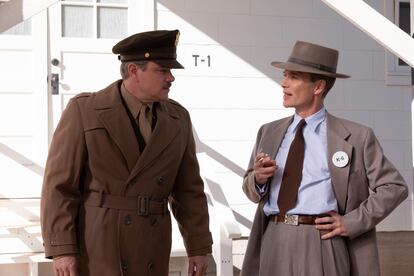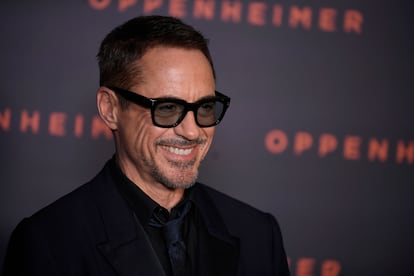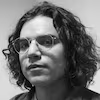‘Oppenheimer’: who’s who in Christopher Nolan’s biopic
The film is filled with true life characters who played an important role in Project Manhattan and in the scientist’s security hearing of 1954

Christopher Nolan’s Oscar nominated film Oppenheimer centers on two pivotal moments in J. Robert Oppenheimer’s career. The first one is Project Manhattan, the research and development that produced the first nuclear weapons, and the second one is the security hearing that resulted in him having his security clearance revoked due to fears of him being an agent for the Soviet Union.
Nolan introduces a wave of characters who played important roles in these moments, with A-list actors portraying them. Here’s a breakdown of the most important figures in the movie and how they influenced Oppenheimer’s life:
Cillian Murphy portrays J. Robert Oppenheimer
During the Manhattan Project, J. Robert Oppenheimer played a pivotal role as the scientific director of the Los Alamos Laboratory, leading a team of brilliant minds to develop the first atomic bomb. His expertise and leadership were instrumental in the successful construction of the bomb, which ultimately played a significant role in ending World War II. However, after the war, concerns arose about Oppenheimer’s past associations with Communist individuals and groups. These concerns led to a security hearing in 1954, where Oppenheimer faced allegations of being a security risk. The culmination of this highly controversial hearing resulted in Oppenheimer’s security clearance being revoked, leaving a stain on his once-illustrious career.
Cillian Murphy stars as Robert Oppenheimer. This is the sixth time the actor works with director Christopher Nolan.
Emily Blunt portrays Katherine “Kitty” Oppenheimer

“Kitty” Oppenheimer was a German American biologist, botanist, and a member of the Communist Party of America. Before she met Robert Oppenheimer, she was the common-law wife of activist Joe Dallet. She was married to Richard Stewart Harrison, a medical doctor with degrees from Oxford University, when she met Oppenheimer while working at the California Institute of Technology, where Harrison was attending a residency. She began an affair with Oppenheimer, and later divorced Harrison after getting pregnant from Robert.
During the Manhattan Project, she worked for the director of the Health Group at Los Alamos, Louis Hempelmann, conducting blood tests to assess the danger of radiation. After the war, she became an alcoholic and developed pancreatitis. After Robert’s death, she lived with Robert Serber until she died of an embolism on October 27, 1972.
Emily Blunt portrays “Kitty” Oppenheimer. This is the first time the actress works with Nolan, and the first time she got a nomination for an Oscar for her work. She has received a Golden Globe Award and two Screen Actors Guild Awards.
Matt Damon portrays Leslie Groves
Lieutenant General Leslie Richard Groves Jr. was a United States Army Corps of Engineers officer who oversaw the construction of the Pentagon and directed the Manhattan Project. Despite wanting a combat assignment for the war, Chief of Army Service Forces Brigadier General Brehon B. Somervell recommended him and later told him, “If you do the job right, it will win the war.”
Groves met with J. Robert Oppenheimer to discuss the creation of a laboratory where the atomic bomb could be designed and tested. Groves was impressed with Oppenheimer’s knowledge and the fact that he understood the issues involved in setting up a laboratory in a remote area. According to later testimonies, Groves detected an “overweening ambition” in Oppenheimer, which convinced him that the scientist was the best and only man to run the laboratory.
During the Manhattan Project, Groves was aware that Oppenheimer had met Haakon Chevalier, one of his Communist associates, and that he told him that a scientist could transmit information of a technical nature to the Soviet Union. Oppenheimer told security officers that three men at Berkeley had been solicited for nuclear secrets by a person who had Communist connections. Groves promised to keep the identity of the three men from the FBI. Groves kept Oppenheimer in the project due to his importance. On July 20, 1943, he ordered that Oppenheimer be given a security clearance “without delay, irrespective of the information which you have concerning Mr. Oppenheimer. He is absolutely essential to the project.”
During Oppenheimer’s security hearing, Groves testified against Oppenheimer. Although he reaffirmed his decision to hire Oppenheimer, he said that under the security criteria in effect in 1954, he “would not clear Dr. Oppenheimer today.”
Matt Damon, who previously worked with Nolan in the sci-fi film Interstellar portrays General Groves.
Robert Downey Jr. portrays Lewis Strauss

Lewis Strauss was a major figure in the development of nuclear weapons. He served two terms in the U.S. Atomic Energy Commission, the second as its chairman, and he was the driving force in the Oppenheimer security hearings held in April 1954.
Strauss had a complicated relationship with Robert Oppenheimer. After the war, in 1947, Strauss offered Oppenheimer the position of director of the Institute for Advanced Study at Princeton. Strauss wanted the development of thermonuclear weapons and a doctrine of deterrence. However, Oppenheimer opposed the development of the hydrogen bomb and proposed a national security strategy based on atomic weapons and continental defense.
Strauss later resented the scientist for his humiliation before Congress regarding opposition to the export of radioactive isotopes to other nations, which Strauss supported. Oppenheimer was called before the Joint Committee on Atomic Energy over the issue in July 1949 and testified that: “My own rating of the importance of isotopes in this broad sense is that they are far less important than electronic devices but far more important than, let us say, vitamins, somewhere in between.”
Oppenheimer’s links to the Communist Party became a concern for Strauss, who distrusted the scientist. In September 1953, Strauss asked FBI director J. Edgar Hoover to initiate surveillance to track Oppenheimer’s movements. He later had the AEC staff compile a list of charges against the scientist and presented them to him in December 1953.
Despite the support of numerous leading scientists and other prominent figures, Oppenheimer was stripped of his clearance one day before it would have expired anyway, as Strauss had wanted. As a result, Strauss has often been regarded as a villain in American history.
Nolan chose Robert Downey Jr. to play the role of Lewis Strauss, the main antagonist of the film. The role has earned the actor several awards, including a nomination for an Oscar.
Florence Pugh portrays Jean Tatlock
Jean Tatlock was a member of the Communist Party and a reporter and writer for the party’s publication Western Worker. She is also known for her romantic relationship with Oppenheimer.
Tatlock met Oppenheimer in 1936 when she was a graduate student and Oppenheimer was a professor of physics at Berkeley. Reportedly, they had a passionate relationship, and although Robert proposed to her twice, she refused. Tatlock struggled with her sexuality and dealt with depression.
The couple continued to see each other after Oppenheimer became involved with Kitty Harrison, whom he married on November 1, 1940. He spent New Year with Tatlock in 1941.
According to some historians, Oppenheimer had an extramarital affair with Tatlock while he was working on the Manhattan Project. However, others point out that they only met once after he was picked as the head of the Los Alamos Laboratory in June 1943. There are conflicting accounts of what happened during their last meeting.
She died by suicide on January 5, 1944. Oppenheimer later named the first test of a nuclear weapon “Trinity” in reference to one of John Donne’s poems. Some say that Tatlock introduced Oppenheimer to the author, and it is widely believed he named the test as a tribute to her.
During Oppenheimer’s security hearing, his association with Tatlock’s friends was used as evidence against him.
Florence Pugh portrays Tatlock in Nolan’s film. This marks the first time the actress works for the director.
Josh Hartnett portrays Ernest Lawrence
Ernest Lawrence was an American nuclear physicist and winner of the Nobel Prize in Physics in 1939 for his invention of the cyclotron. He worked on uranium-isotope separation for the Manhattan Project.
He met Oppenheimer at Berkeley, becoming one of his best friends (he later named his son Robert after the physicist).
He did not oppose the investigation of Oppenheimer. He tended to distance himself from those under investigation rather than supporting them. He said he was unable to testify at the hearing because of illness. However, an interview transcript in which Lawrence stated that Oppenheimer “should never again have anything to do with the forming of policy” was presented at the hearing, and several other members of Lawrence’s Radiation Laboratory did testify against Oppenheimer in person. This stained their reputation within the scientific community.
Benny Safdie portrays Edward Teller
Edward Teller was a Hungarian-American theoretical physicist who is known as “the father of the hydrogen bomb.” He was also a member of the Manhattan Project.
He also testified against Oppenheimer at his security clearance hearing. Teller had a difficult relationship with Oppenheimer as they clashed many times over issues relating to fission and fusion research. He was the only member of the scientific community to state that Oppenheimer should not be granted security clearance. He testified: “I would like to express a feeling that I would feel personally more secure if public matters would rest in other hands.”
His testimony has been described as the most damning, and he was singled out and blamed for the hearing’s ruling. Robert Christy, a theoretical physicist, refused to shake his hand, and Teller was ostracized by the physics community.
David Dastmalchian portrays William L. Borden
William L. Borden was an American lawyer who worked as the executive director of the United States Congress Joint Committee on Atomic Energy. He advocated for nuclear weapons development in the United States government.
Borden is better known for having written a letter accusing Robert Oppenheimer of being an agent of the Soviet Union, which led to the Oppenheimer security hearing of 1954. He testified against Oppenheimer, but he couldn’t challenge him with charges of treason.
Tom Conti portrays Albert Einstein
Albert Einstein was a German-born theoretical physicist considered one of the most influential scientists of all time. He is best known for developing the theory of relativity and made important contributions to quantum mechanics.
Einstein was one of the scientists who wrote a letter to President Theodore Roosevelt, recommending that the U.S. pay attention and engage in nuclear weapons research. In 1954, a year before his death, Einstein said to his old friend, Linus Pauling, “I made one great mistake in my life — when I signed the letter to President Roosevelt recommending that atom bombs be made; but there was some justification: the danger that the Germans would make them...”
He later developed a relationship with Robert Oppenheimer, who said about Einstein: “He was almost wholly without sophistication and wholly without worldliness... There was always with him a wonderful purity at once childlike and profoundly stubborn.”
Sign up for our weekly newsletter to get more English-language news coverage from EL PAÍS USA Edition
Tu suscripción se está usando en otro dispositivo
¿Quieres añadir otro usuario a tu suscripción?
Si continúas leyendo en este dispositivo, no se podrá leer en el otro.
FlechaTu suscripción se está usando en otro dispositivo y solo puedes acceder a EL PAÍS desde un dispositivo a la vez.
Si quieres compartir tu cuenta, cambia tu suscripción a la modalidad Premium, así podrás añadir otro usuario. Cada uno accederá con su propia cuenta de email, lo que os permitirá personalizar vuestra experiencia en EL PAÍS.
¿Tienes una suscripción de empresa? Accede aquí para contratar más cuentas.
En el caso de no saber quién está usando tu cuenta, te recomendamos cambiar tu contraseña aquí.
Si decides continuar compartiendo tu cuenta, este mensaje se mostrará en tu dispositivo y en el de la otra persona que está usando tu cuenta de forma indefinida, afectando a tu experiencia de lectura. Puedes consultar aquí los términos y condiciones de la suscripción digital.









































